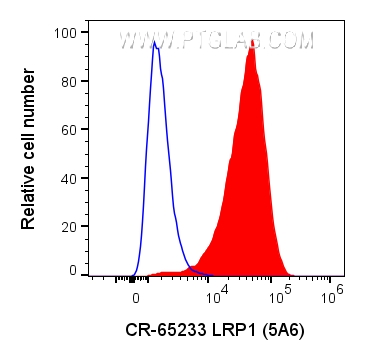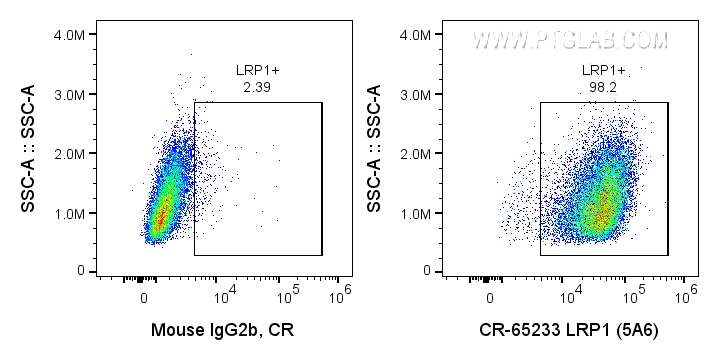验证数据展示
经过测试的应用
| Positive FC detected in | U-87 MG cells |
推荐稀释比
| 应用 | 推荐稀释比 |
|---|---|
| This reagent has been pre-titrated and tested for flow cytometric analysis. The suggested use of this reagent is 5 µl per 10^6 cells in a 100 µl suspension or 5 µl per 100 µl of whole blood. | |
| Sample-dependent, Check data in validation data gallery. | |
产品信息
CR-65233 targets LRP1 in FC applications and shows reactivity with human samples.
| 经测试应用 | FC Application Description |
| 经测试反应性 | human |
| 免疫原 | Full length native protein (purified) 种属同源性预测 |
| 宿主/亚型 | Mouse / IgG2b |
| 抗体类别 | Monoclonal |
| 产品类型 | Antibody |
| 全称 | low density lipoprotein-related protein 1 (alpha-2-macroglobulin receptor) |
| 别名 | A2MR, Alpha 2 macroglobulin receptor, APOER, Apolipoprotein E receptor, APR, CD91, FLJ16451, IGFBP3R, LRP, LRP 1, LRP1, LRPICD, TGFBR5 |
| 计算分子量 | 505 kDa |
| GenBank蛋白编号 | BC045107 |
| 基因名称 | LRP1 |
| Gene ID (NCBI) | 4035 |
| RRID | AB_3084983 |
| 偶联类型 | Cardinal Red™ Fluorescent Dye |
| 最大激发/发射波长 | 592 nm / 611 nm |
| 形式 | Liquid |
| 纯化方式 | N/A |
| UNIPROT ID | Q07954 |
| 储存缓冲液 | PBS with 0.09% sodium azide and 0.5% BSA , pH 7.3 |
| 储存条件 | Store at 2-8°C. Avoid exposure to light. Stable for one year after shipment. |
背景介绍
LRP1 (Prolow-density lipoprotein receptor-related protein 1), also known as A2MR, APOER and CD91, is a type I transmembrane protein that belongs to the LDLR family. LRP1 is synthesized as a transmembrane glycosylated precursor of 600 kDa, and is subsequently cleaved to generate a large 515-kDa N-terminal extracellular subunit and an 85-kDa C-terminal transmembrane subunit, which are noncovalently associated with one another (PMID: 2112085; 8546712). LRP1 is a multifunctional receptor involved in the clearance of a large number of diverse ligands and modulating various cellular processes. LRP1 is implicated in conditions such as atherosclerosis, cancer and neurodegenerative diseases (PMID: 28381441).
实验方案
| Product Specific Protocols | |
|---|---|
| FC protocol for Cardinal Red™ LRP1 antibody CR-65233 | Download protocol |
| Standard Protocols | |
|---|---|
| Click here to view our Standard Protocols |

